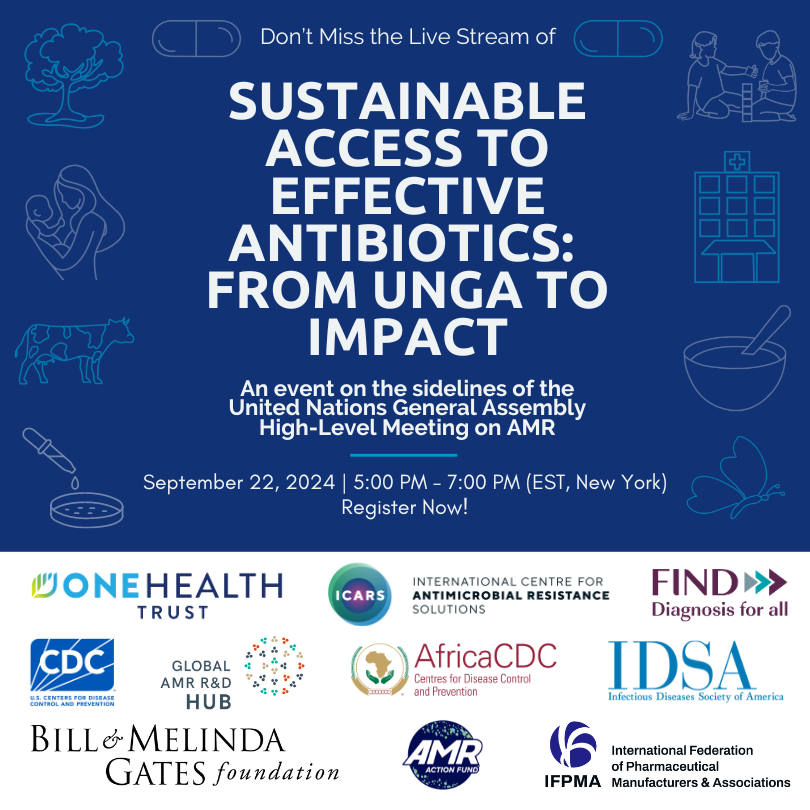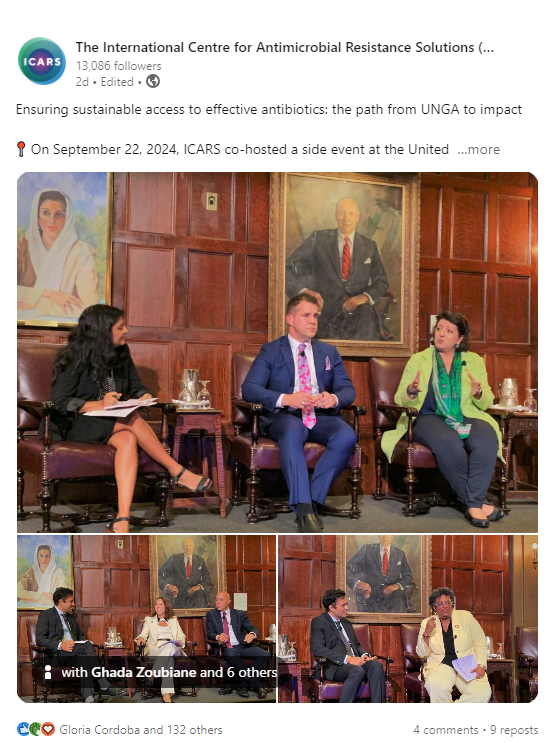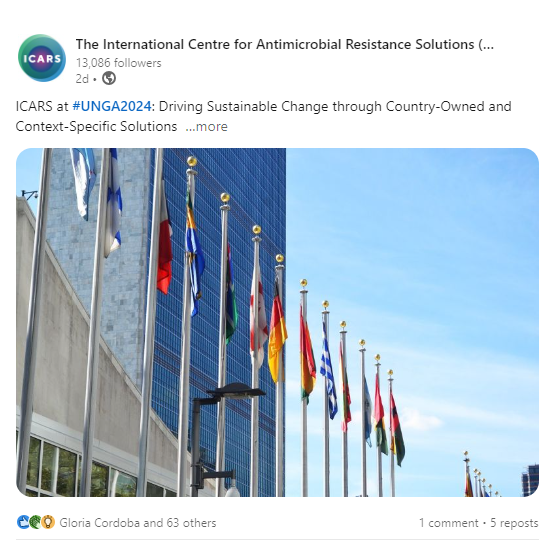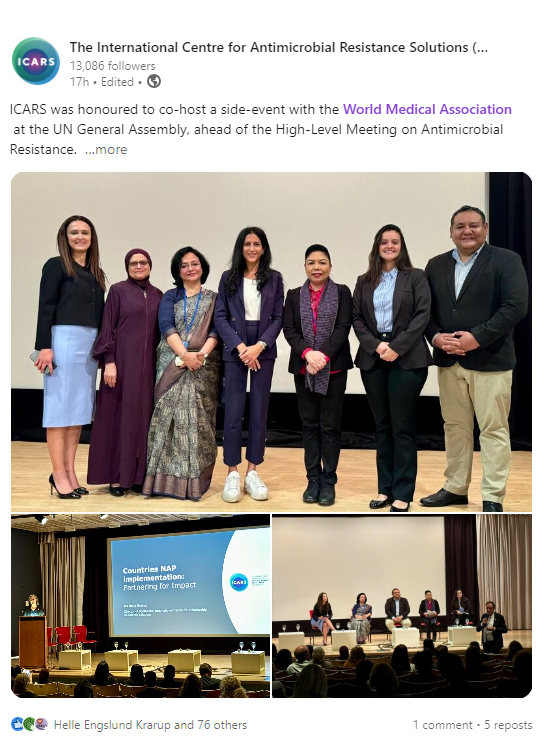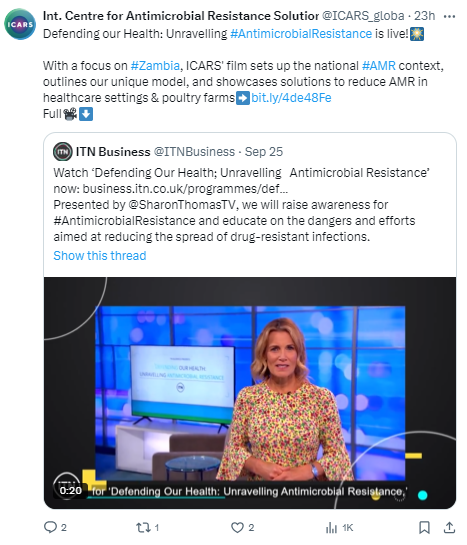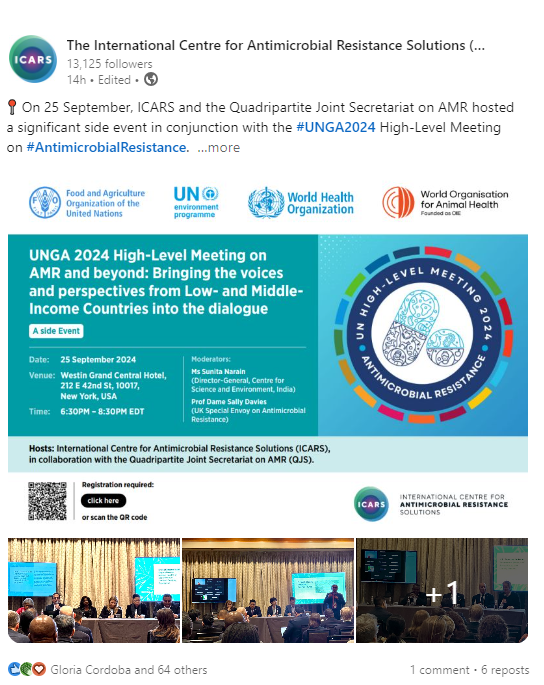
ICARS at the UNGA 2024: Driving sustainable change through country-owned and context-specific solutions
ICARS participated in the UN General Assembly’s High-Level Meeting on Antimicrobial Resistance (AMR) week in New York in September 2024, a crucial event where global leaders addressed the cross-border threat of AMR to global health, food security, economic development, and the 2030 Sustainable Development Goals. As an organisation working with Low- and Middle-Income Countries (LMICs) to create context-specific and country-owned solutions, we remain committed to advancing the One Health approach and fostering partnerships for sustainable change.
This webpage is designed to give updates on the UN General Assembly, including ICARS’ events, participation, and reccomendations.
Our Vision
Prior to the UN General Assembly, ICARS released a set of recommendations to member states and the global AMR community, which we are committed to upholding through our work. Below you can read about how these recommendations are woven through ICARS’ model of working, with specific examples from our activities around the world.
Promote science-policy-implementation dialogue and interface
Although extensive research has revealed successful solutions for mitigating AMR, there is a critical gap in translating these evidence-based solutions into actions. Many countries have developed AMR NAPs, but only a third have been costed with monitoring and evaluation plans in place. In resource limited settings, the challenge remains how best to prioritise and implement solutions to mitigate AMR. ICARS specifically addresses the challenge of NAP implementation in LMICs by practicing a bottom-up (investigator driven), top-down (policy-driven) approach to bridge the science into policy gap.
In Benin, the NAP highlighted the need for more attention to be paid to AMR in the poultry sector. To address this Professor Victorien Dougnon is coordinating an ICARS project to reduce the import of antimicrobial resistance into Benin through day-old chicks and hatching eggs. “We work closely with ministry people and have full support from their side, so when we get interesting results, they are ready to take action.”
Support setting up a sustainable ecosystem of evidence and innovation generation
To achieve sustainable change with maximum impact, ICARS’ projects aim to strengthen relevant in-country research capabilities to support the uptake of context-specific solutions into policy. Because AMR is a One Health problem, we take multidisciplinary approaches and aim to mobilise a range of sectors to achieve better outcomes.
Daniel Joshua Msesa is a Public Health Specialist based at the Zanzibar Health Research Institute working on an ICARS project that aims to improve diagnostics uptake and enhance antimicrobial stewardship activities. In this video he discusses how “working with a multidisciplinary team has been enlightening and rewarding.”
Advocate for context-specific and country-owned solutions
ICARS’ activities are designed to empower country leadership by engaging with and listening to local knowledge and experience. Our co-development process ensures AMR mitigation priorities are self-identified by country teams to address local and national needs, build on existing efforts, and feed into or build on existing National Action Plans.
Ntombi Mudenda from the University of Zambia, School of Veterinary Medicine is engaged with an innovative ICARS project that works with small-scale farmers to reduce both antimicrobial use in broiler production and residue presence in broiler meat. In this video she stresses the importance of building local-ownership: “Make sure that before you actually start the study, you get people on board who are going to help you actually get to the people that you need to get to and get some buy-in to the project.”
Approach AMR as a horizontal challenge
Antimicrobial resistance is a global challenge that transcends sectors and demands integrated and synergistic action. AMR mitigation should be seen as an integrated part of many other aspects of One Health system strengthening initiatives, such as vaccination, biosecurity, infection prevention and control, WASH, pandemic preparedness, sustainable food systems, waste management, access to healthcare and diagnostics. ICARS believes working horizontally could generate substantial co-benefits and bridge investment gaps.
ICARS has an ongoing partnership with the International Vaccines Institute (IVI) to align vaccine and AMR strategies within the context of Low- and Middle-Income Countries, with a recent RFP launched for regional work in South and South-East Asia. Furthermore, in collaboration with the International Development Research Centre (IDRC), ICARS funded a project which sought to identify practical pathways for integrating gender and equity considerations into antimicrobial resistance research. The ‘practical pathways’ resources provide researchers with hands-on support for incorporating gender and equity considerations into their studies.
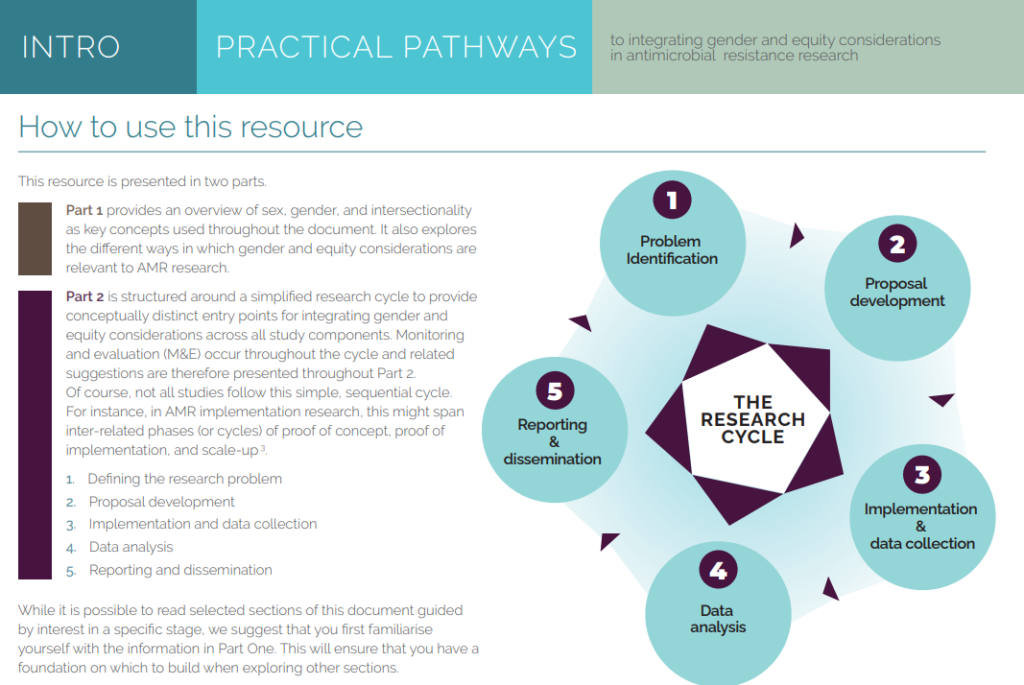
Strengthen global governance and leadership
A declaration is only valuable when commitments are translated into action. ICARS is proud to be a member of the AMR Multi-Stakeholder Partnership Platform , established and facilitated by the Quadripartite organizations (FAO, UNEP, WHO and WOAH), to catalyse a global movement for action against AMR. By fostering cooperation between a diverse range of stakeholders the platform aims to leverage efforts across all levels of the One Health spectrum. ICARS is currently actively engaged across a range of MSPP Action Groups.
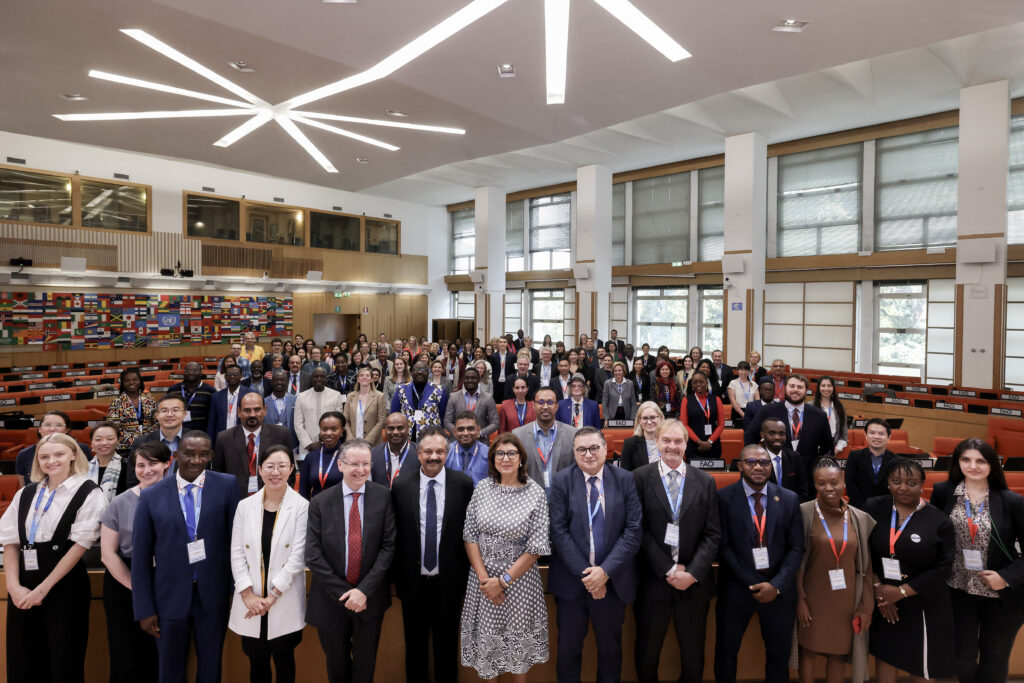
Transform AMR funding
The ICARS model, which fosters local-ownership by working top- down and bottom-up with local partners, is also intended to generate more efficient and sustainable funding streams to our projects. With a strategic focus on cost-effectiveness and partnership, and a core pillar of our work focused on capacity building, we hope to increase opportunities for country-led project expansion, scale-up and complimentary initiatives.
In May 2024 we co-hosted a side-event during the World Health Assembly which focused on ways to optimise current and new funding mechanisms for AMR mitigation. The follow-up brief provides considerations for thinking beyond the traditional Overseas Development Assistance model, and instead prioritising mobilisation of domestic funding, identifying different investment models and sources at regional and national levels.
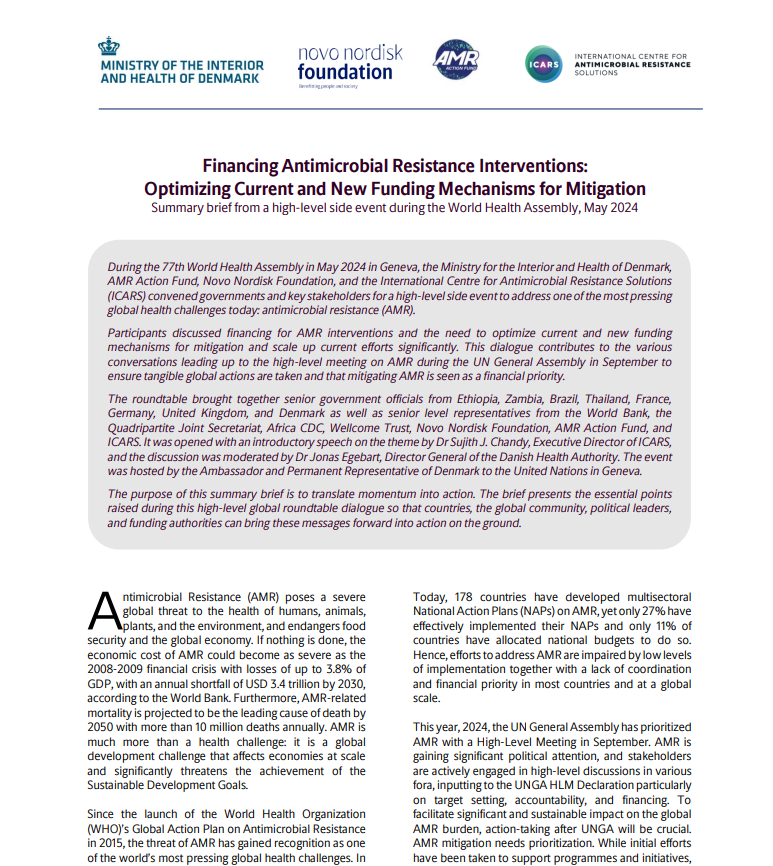
Our events and participation
ICARS was honoured to attend the UN General Assembly week and co-host several side events with a range of diverse partners. Below, you’ll find a summary of each event and the key messages associated with them.
Ensuring sustainable access to effective antibiotics: The path from UNGA to Impact
September 22nd
Key voices from across the globe shed light on the AMR crisis, propose evidence-based solutions, and united in a call to action to ensure the sustainability of antibiotics and our collective health. ICARS’ Ghada Zoubiane spoke on a panel about public understanding of AMR.
Co-hosts: One Health Trust, Africa Centres for Disease Control and Prevention, the United States Centers for Disease Control and Prevention, the International Federation of Pharmaceutical Manufacturers & Associations, Global AMR R&D Hub, FIND, the AMR Action Fund, the Infectious Disease Society of America, and the Bill & Melinda Gates Foundation
From Policy to Action: Successful implementation of multisectoral AMR programs in LMICs
September 24th
By bringing together country representatives, policymakers, AMR specific donors and regional and international organisations, this side-event served as a discussion and exchange of best practices, as well as an opportunity to present examples of successful AMR interventions across the One Health Spectrum. ICARS’ Helle Krarup presented, alongside ICARS partners from Brazil, Cambodia and Peru. Sabiha Essack ended the session with reflections on the UN Declaration on AMR.
Co-hosts: World Medical Association
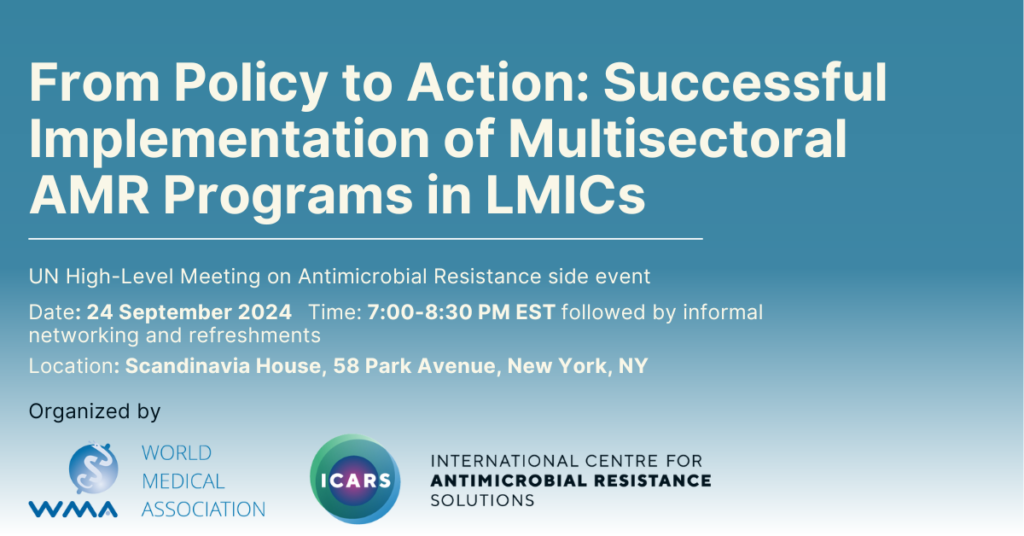
Bringing the voices and perspectives of Low- and Middle-Income Countries into the Global Policy Dialogue
September 25th
This high-level dialogue discussed the perspectives of Low- and Middle-Income Countries (LMICs) and vulnerable communities most impacted by antimicrobial resistance (AMR). The facilitated discussion focused on the experiences, challenges, and successes in implementing multisectoral National Action Plans (NAPs) through a One Health approach, with a focus on equitable access to sustainable solutions. Sujith J. Chandy presented, alongside ICARS partners from LMICs.
Co-hosts: The Quadripartite Joint Secretariat on AMR
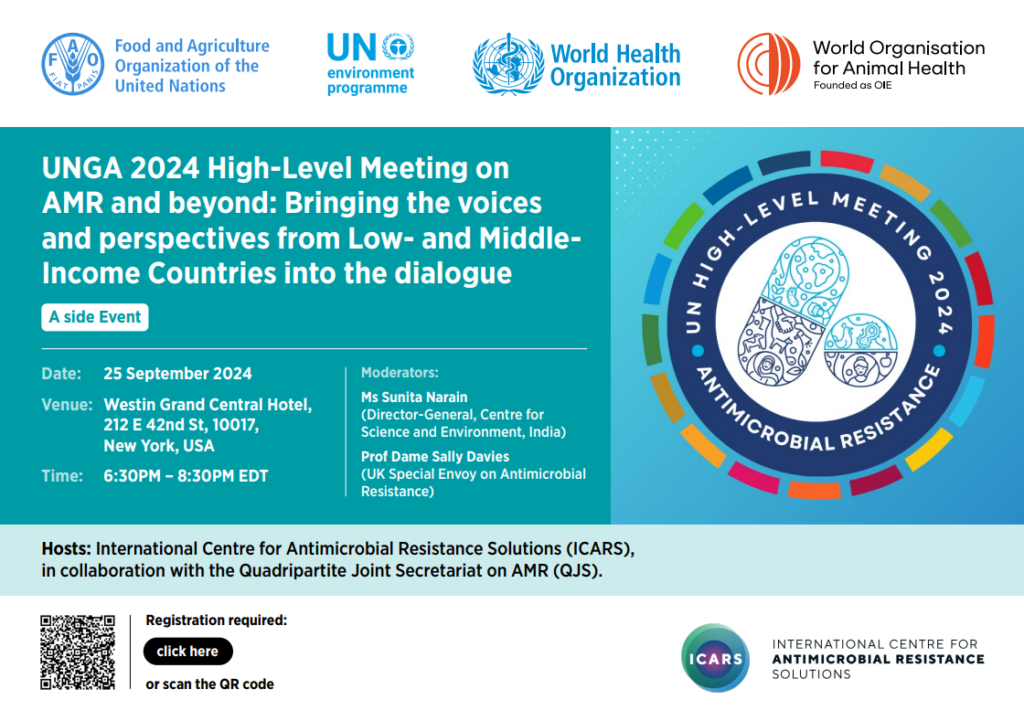
UN General Assembly High-Level Meeting on antimicrobial resistance
September 26th
The theme of the high-level meeting was ‘Investing in the present and securing our future together: Accelerating multi-sectoral global, regional and national actions to address Antimicrobial Resistance’. This headline event was a critical opportunity for political leaders to approve a new declaration which contains concrete targets and practical steps for addressing the urgent issue of antimicrobial resistance around the world.
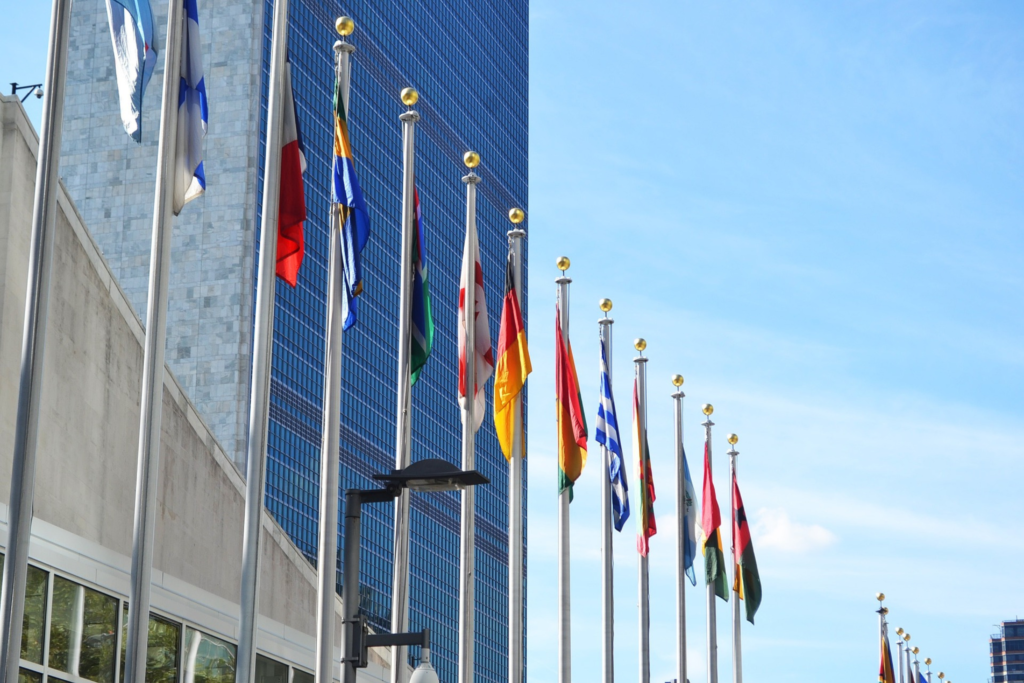
Live from UNGA!
Get involved
Sign up for the ICARS newsletter
ICARS mails out a newsletter each quarter with an update on our recent activities, resources and opportunities. Subscribe to stay up to date on our work and be notified of upcoming opportunities.

